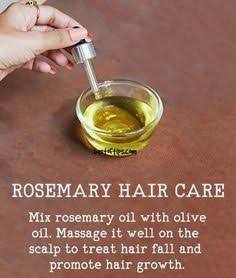Having strong, thick hair that grows like a weed is such a blessing — one that many folks simply don’t have, whether that be due to heat damage, hormone-related hair loss, genetics, or what have you. The internet is crawling with so-called solutions for that, however, one of which is rosemary tea for hair growth. On TikTok especially, you’ll find droves of people throwing rosemary leaves into pots of boiling water to concoct a special rinse or spray they claim makes new hair sprout like Disney movie magic (or, you know, like Rogaine).
Before and after videos of restored hairlines be damned, the question still lingers: does rosemary tea really promote hair growth? We asked experts to give us the rundown on whether or not rosemary tea works for hair growth, how it works, and what research exists on the subject.
For context, we’re not talking about a brand-made hair product you can buy on a shelf; we’re talking about a simple homemade remedy of rosemary leaves (which you can buy in the produce section of most grocery stores) steeped in hot water for a few hours. The reddish liquid is then strained; from there, most folks funnel it into a spray bottle they can spritz on their scalp regularly.
When asked point-blank if this stuff actually makes hair grow any faster or thicker than usual, Mona Gohara, M.D., a board-certified dermatologist in Connecticut, couldn’t deliver a firm yes or no — and with good reason. Her TL;DR: rosemary tea isn’t directly proven to make hair grow, but there is a tiny morsel of evidence that suggests it might lend a helping hand in the process.
Gohara cites a study on rosemary oil — different from rosemary tea but consisting of the same key ingredient, it should be noted. Cosmetic chemist Ron Robinson calls out the same study when asked about rosemary’s effect on hair. The study compared the effect of rosemary oil to that of Rogaine (2 percent minoxidil) on 100 subjects. “The same amount of hair growth was noted in both groups over six months,” Gohara summarizes. “Although this data sounds promising, this has not been reproduced.”
She goes on to compare rosemary oil, in this context, to crutches for a broken leg: helpful in the healing process but not the direct cause of the healing. More specifically, “rosemary oil eliminates dirt, strengthens follicles, provides moisture to the scalp, and minimizes breakage.” That, she elaborates, creates a better environment for hair growth than one might have without the help of rosemary oil, which would explain that study’s comparable results.
If you ask cosmetic chemist Ginger King the same question, she’ll give you a confident stamp of approval and cite similar effects — but only for rosemary oil, not tea. “It works as an antioxidant, antimicrobial, anti-inflammatory, and most importantly, microcirculation enhancer,” she explains. “An antioxidant is a must for all hair-care to preserve integrity; microcirculation will help to reenergize the scalp for better growth.”

